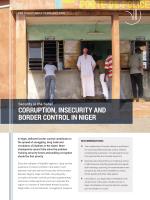Fighting corruption is key to improve border control in Niger
In Niger, building more border offices has proven insufficient to tackle the spread of smuggling, drug trade and circulation of jihadists in the Sahel. Instead, everyday petty corruption makes border control ineffective and, while apparently benign, this has severe consequences in contexts of volatile security.
In this policy brief, Eric Hahonou argues that without complementary activities, the multiplication of border offices could even expand opportunities for corruption. Instead, security policy should focus on creating a culture of effectiveness including systematic and regular staff meetings, reporting, law implementation and sanctions as well as new modalities to reward border guards and other state agents.
Because corruption is, to a large extent, embedded in the social norms of the users of public service in Niger, sensitisation among transporters, passengers and traders is crucial.


